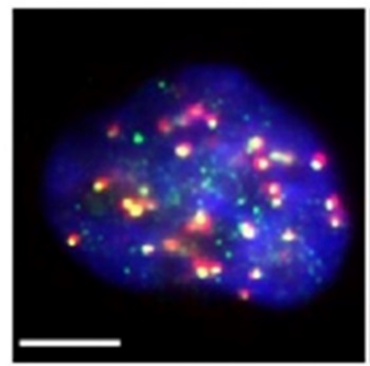Mitosis: UBAP2L, a new regulation factor
The PLK1 kinase is an important regulator of mitosis, but the signaling pathways linking localized PLK1 activity to its protein stability remain elusive. In a paper published in the journal EMBO Reports, Izabela Sumara's lab with Evanthia Pangou as lead scientist identified the ubiquitin-binding factor UBAP2L as a novel regulator of PLK1, which controls the localization and stability of its protein in a cell cycle-dependent manner, allowing genome fidelity to be maintained.

Mitosis ensures the equal distribution of genetic information from a mother cell to two daughter cells. Important morphological changes take place during mitosis, which are largely mediated by multiple post-translational modifications (PTMs) of mitotic factors.
The enzyme Polo-Like Kinase 1 (PLK1) plays an essential role throughout mitosis, regulating early mitotic spindle assembly as well as chromosome segregation and cytokinesis, thus preserving genome stability and cell survival. However, the ubiquitin-dependent spatiotemporal regulation of PLK1 during mitosis remains poorly defined.
In this paper, scientists identify a novel regulator of PLK1 acting during mitosis: the ubiquitin-binding protein 2-like (UBAP2L). To do so, they performed a high-content visual screen of small interfering ribonucleic acids and showed that depletion of the UBAP2L protein causes the appearance of nuclear atypia. Subsequently, they demonstrate that cells lacking UBAP2L are characterized by significant mitotic delay and severe chromosome segregation errors. In the absence of UBAP2L, PLK1 is abnormally retained at several mitotic structures and fails to be degraded during mitotic exit. Finally, elevated levels of PLK1 and kinase activity eventually lead to genomic instability and cell death. Inhibition of PLK1 in cells lacking UBAP2L is sufficient to resolve these problems and ensure proper mitosis.
Thus, the scientists highlight the necessary presence of UBAP2L to fine-tune ubiquitin-mediated PLK1 turnover during mitosis to maintain genome fidelity.

Credit: Guerber L, IGBMC
Spinning disk time-lapse microscopy of HeLa Knock-In (KI) PLK1-eGFP cells treated with siCTL or siUBAP2L and synchronized with the Double Thymidine Block and Release (DTBR) protocol during mitosis. Selected images from the movies are shown and the corresponding time is indicated in minutes. SiR-DNA was used for DNA labeling. Scale=5 and 8 µm.
